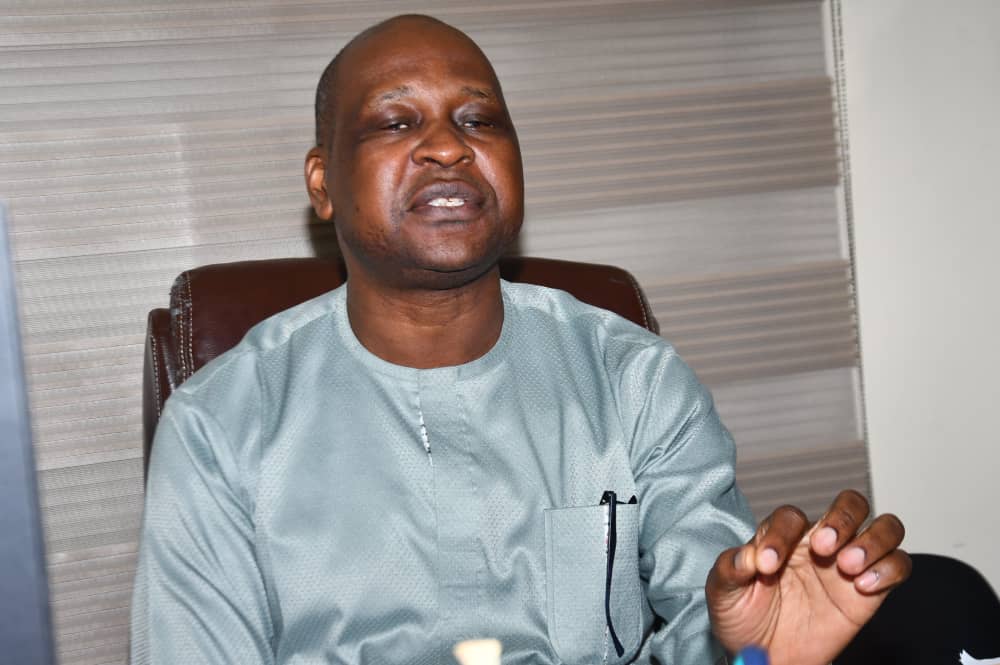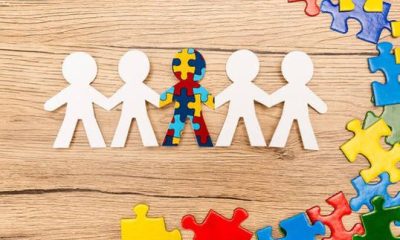Interviews
Autism: Expert Shares Insight On Neurological Health Disorder, Advocates Awareness Creation, Action

INTERVIEW
The healthcare system in Nigeria is generally categorized as below par in comparison with those of other climes, even within the same African space, not to mention those in more advanced countries such as Europe and America.
Amidst the sorry state of healthcare delivery in Nigeria, the particular needs of persons living with disabilities (PWD) and neurologically challenged persons apparently bears a greater toll of this deficit.
In the effort to beam more light on this critical segment of healthcare need, in order to fasttrack awareness for both government and the general public and also drive development, Special Needs News has reached out to expert to underscore the critical need for improvement in this area of healthcare system in Nigeria.
In this interview, Dr. Shatima shares insights from his extensive experience and his ongoing efforts to advance pediatric care and neurological health for children across Nigeria.
Dr. Denis Richard Shatima is a Consultant Paediatrician with over three decades of experience. He is currently serving as Chief Consultant Paediatrician on child neurology at the National Hospital Abuja, he has earned a reputation for excellence and innovation in pediatric care.
A Fellow of the West African College of Physicians in Pediatrics, Dr. Shatima has made substantial contributions to advance child healthcare and neurology in Nigeria.
His extensive career is marked by commitment to enhance the quality of life for children with neurological conditions, ensuring that they receive the best possible care.
The consultant pediatrician, who hails from Hong Local Government Area of Adamawa State, is deeply rooted in his community and is passionate about improving pediatric healthcare throughout Nigeria. His work is a testament to his dedication to local and national healthcare advancement.
What inspired you to specialize in the study of children’s brain development?
I am Dr. Shatima, a pediatrician with the National Hospital, and I have special interest in child neurology, which means I specialize in the brain of children. One of the reasons why I became a paediatrician is that I like children and they don’t know how to pretend. When they are sick, they look sick.
While the other segments may not be so straightforward, immediately parents enter their home, they will know that their child is sick because the usual jumping up and down is not there. So that motivated me to specialize in that field.
One of the key things that attracted me to child neurology is seizures, that is convulsion.
In Africa and Nigeria, we always have this spiritual inclination, it is an evil spirit, it is contagious, sometimes they lock the child in the room because of stigmatization and all that.
Meanwhile, the truth is that there is no country that does not have children with seizures. So it has nothing to do with evil spirit or being contagious.
So I felt I could make my own little difference in changing people’s perception and probably the outcome of children with seizures.
What is autism?
I am happy that gradually people are beginning to come to terms with the diagnosis, otherwise before 2000, if you tell a parent that his/her child has autism, they first thing is to reject it, ‘it is not my portion, my enemy is at work,’ just like we always interpret most bad news, which is understandable. I mean, nobody wants to hear bad news and sometimes the way it is even disclosed to the parents too, it is harmful, let me put it that way. Gradually, globalization and has helped to broaden our understanding of autism.
Autism is just an abnormal behaviour of a child that affects his/her ability to communicate freely, their interest is usually restricted. An autistic child does not even associate with his siblings, talk more of strangers, so they prefer to be on their own.
Sometimes the say words that nobody understands, sometimes a child that says mommy, bye-bye, good morning, suddenly loses those milestones, these are usually the red flags that make parents say, what is going on?
Unfortunately, because of cultural inclinations, some say, oh, no, his father talked at the age of two, no, no, no, his senior brother talked at one and half years, they don’t know that development is individualized, there is no way because the father talked at two years, the son too will talk at the same age. So to put it mildly, it is an abnormal behaviour characterized by poor socialization, communication and restricted interest. They want to do things their own way, repeatedly, day in and day out, any attempt to change it, is usually resisted.
How does autism impact an individual’s intelligence, if at all?
Autism itself does not inherently impact an individual’s intelligence. People with autism have a wide range of intellectual abilities, from above average to below average, just like the general population. What is interesting about autistic children, let me say it without contradiction, a lot of them are extremely intelligent. The condition does not affect their mental aspect, it just affects their ability to socialize and communicate very well. I know a few doctors that are doing very well and are autistic so they can be very intelligent.
What signs should parents look out for when it comes to autism?
There are several signs to look out for as a parent and it is important to understand that these signs can be age-dependent. Autism is often diagnosed between 12 and 18 months, as many signs become more apparent around this age. For children under one year, it can be more challenging to diagnose, but certain red flags may warrant further investigation, especially if there is a family history of autism.
The signs to consider include: Communication Delay: If a child who previously used words like “mama” or “daddy” suddenly becomes mute or does not respond to their name, this is a significant red flag.
Social Interaction: Children with autism may prefer to play alone and might show limited interest in interacting with siblings or other people. They might react negatively if someone tries to join them, showing signs of discomfort or resistance.
Behavioural Patterns: Repetitive behaviours such as hand-flapping, spinning or unusual sensory responses (like covering ears) can be indicative of autism. A high pain threshold, where the child does not cry despite injuries, can also be a sign.
Poor Eye Contact: Autistic children often have reduced eye contact. Instead of engaging with people around them, they may focus on objects or look away.
Food Preferences: Children with autism might have very restricted food preferences and may refuse to eat anything outside their usual diet, showing strong reactions to changes in their food routine.
Sensory Sensitivities: They may have heightened sensitivity to sensory experiences, including textures, sounds or light.
It is crucial for parents to consult a healthcare professional if they notice these signs, rather than attribute them to cultural beliefs or assumptions, such as attributing fever or diarrhea solely to teething. Misconceptions about teething can lead to delay in addressing possible underlying issues, which could be critical for the child’s health and development. Ultimately, seeking professional evaluation ensures that potential issues are properly assessed and managed. Early intervention can make a significant difference in supporting a child’s development and addressing their needs effectively.
If a child initially develops certain skills and then loses them, does this indicate autism or is it simply a red flag that warrants further investigation?
If a child initially develops certain skills and then loses them, it can indeed be a red flag that warrants further investigation, but it does not necessarily indicate autism on its own. This phenomenon is known as developmental regression and it can be associated with a variety of conditions, including but not limited to autism.
We always advise parents to, once you see those signs, to go to the hospital. The first thing, of course, the doctor will examine the child. Typically, even a junior doctor can start suspecting that, oh, he/she actually has the threat of autism which can be mild, moderate and severe.
How is Autism Spectrum Disorder evaluated in Nigeria? Are there specific tests? How do professionals distinguish between a child with autism and one experiencing developmental delay?
The evaluation starts when the mother brings the child to the hospital with complaints that he is yet to talk, he is not behaving like his mates. By the time you ask questions and evaluate the child’s development, and all that, as a doctor, because that is how we are trained, you take the history, you do the physical examination, and then based on that, you now start thinking, what can it be? You can now say, okay, even though the child may have signs of autism, let me subject it to the way that it is supposed to be. And the next thing is to do what we call developmental assessment, which is a standard tool used all over the world.
It is a sort of questionnaire and then you score the child. Once you are able to establish that the child has a problem with social communication and have two of the features of restricted and repeated actions that actually gives you the diagnosis, this is a standard tool.
It is available online and it has been validated that culture and tribe does not affect them.
Could you explain the different levels of autism and how they are determined?
In assessing Autism Spectrum Disorder (ASD), various parameters are evaluated, similar to a marking scheme. For example, if an individual scores seven out of 10, it may indicate a milder form of ASD. Scores between five and six suggest a moderate level of the disorder, while scores of four or below typically indicate a more severe form. One of the key features of severe ASD is significant challenges in communication, including verbal and nonverbal aspects. This difficulty in communication often plays a crucial role in determining the severity of the disorder.
Are you saying that complete lack of communication might indicate a more severe condition?
Yes, among the other parameters, communication has a very high mark. So, if a child does not communicate at all, does not listen, you call his name, he does answer. Yeah, it is a serious thing.
What are the causes of autism? Is it primarily genetic or do environmental factors like diet or parental behaviour during pregnancy play a role? Was autism less prevalent in the past or there was less awareness? Are there precautions that expectant parents can take to reduce the risk of autism?
The truth is that no one knows exactly what causes autism. Unlike certain medical conditions where the cause can be identified—like malaria, where a blood test can reveal the presence of malaria parasite or meningitis where the examination of cerebrospinal fluid can confirm the diagnosis, autism does not have a single identifiable cause. This makes it more complex to understand.
However, research has identified several factors that are commonly associated with autism, with genetics being one of the most significant.
Scientists have discovered that multiple genes, acting together—a concept known as polygenics—can lead to signs and symptoms of autism.
In addition to genetics, maternal factors such as advanced age during pregnancy and prematurity are also linked to autism. Premature babies, for instance, are born before their bodies, especially their brains, are fully developed for life outside the womb, which can lead to various complications, including those related to brain development.
Environmental factors also play a role. Exposure to certain chemicals, such as lead, has been implicated, and more recently, concerns have been raised about the potential impact of lithium—a key component in rechargeable batteries—on child development.
One of the more surprising risk factors that has emerged in recent years is screen time. Extensive research has shown that prolonged exposure to screens, whether from smartphones, tablets or televisions can negatively affect a child’s behaviour and language development. In fact, guidelines in developed countries now recommend limiting screen time based on a child’s age. For example, children under 18 months should have little to no screen exposure, yet it is not uncommon to see infants as young as six months being given screens to watch, which can disrupt brain development.
The impact of screens is not just limited to behaviour and language; it also affects sleep. The radiation emitted by screens can interfere with a child’s sleep pattern, preventing the brain from resting adequately. This is why screen time is often restricted in many families to holidays or weekends.
While we cannot completely eliminate the use of screens in our children’s lives, it is crucial to manage and limit their exposure to ensure healthy development.
Can individuals with autism outgrow the condition or is it a lifelong condition?
Autism is generally considered a lifelong condition, meaning that individuals do not “outgrow” it. However, the expression and impact of autism can change over time. With appropriate support, therapy and intervention, individuals with autism may develop new skills, improve their social communication abilities and adapt better to their environment. It can improve with age due to brain maturation, but studies have shown that adults with autism and ADHD may have higher crime rates. This is because these conditions can affect behaviour and reasoning, leading to behaviours that might result in criminal activities.
In developed countries, where they track individuals into adulthood, it has been observed that people with autism and ADHD often have higher crime rate compared to those without these conditions. This can be attributed to the way these conditions impact behavior and decision-making, which might make some individuals more susceptible to committing crimes.
For parents, there are specific programmes designed to help. In advanced countries, there is a practice known as “well-child visits.” This means bringing your child to a healthcare provider regularly, even if the child appears healthy. These visits are proactive, aiming to identify potential issues early, much like how immunizations are managed. Early detection and intervention are crucial, as it can lead to better outcomes compared to addressing issues only when they become severe.
However, in some places, parents might not be aware of, or participate in these well-child visits. For instance, at the National Hospital of Waiawa, although a well-child visit clinic was established, many parents do not utilize it because they believe their child is fine and saw no need for extra checks. This mindset can delay the detection of issues, similar to how untreated illnesses can become more severe over time.
Regarding medications, there are treatments available for managing symptoms associated with autism. For example, medications can help manage aggressive behavior, attention deficit hyperactivity disorder or seizures, which can sometimes occur alongside autism.
When it comes to supplements, caution is advised. While some might be beneficial, especially if tests show deficiencies in nutrients like folic acid, vitamin B, vitamin D or magnesium, many products marketed as cures can be misleading. It is important to rely on evidence-based treatments rather than products that make broad claims without scientific backing.
Overall, individualized care and early detection are key. Understanding and managing co-occurring conditions alongside autism can significantly improve outcomes and quality of life.
The body will not say because he is already autistic, let the others stay away from him. So you can have comorbidities, you can have other illnesses in addition to what you are going through as well. So you individualize them.
What medications are available to help manage symptoms of autism and how do they address specific aspects of the condition?
Well, I tend to run away from sub-dementors as a doctor, simply because it has been abused. I am not saying that there are no supplements that can be used. For example, if you assess the child, do some blood work and realize that his folic acid level is very low, his vitamin D level is very low, which are some of the routine tests we do. You you can put them on treatment. But if you go online, you will see more than 100 products. My thought as a doctor is that not all of them are what they say. They are just looking for a market.
One thing that I have always been careful about is a single product can treat more than 100 ailments, I always say this person assumes the cost of this illness is the same. My sister, if you have a headache today, for a doctor, more than 100 things can cause it. Ordinary sleep deprivation causes headache. High blood pressure causes headache. Your sinuses get blocked, gives you headache. So how can I assume that one medicine can treat high blood pressure, unblock sinuses, address sleep deprivation, does it make sense? Because the causes are different, that means their treatment should be different. And I always tell people, if you have a headache when you take paracetamol, of course the headache will go. But what is the effect of paracetamol?
You made reference to what is obtainable and what isn’t. Do you think the Nigerian government is doing enough?
Unfortunately, to be realistic, no. Some countries give parents some support because they have children with special needs. Now, let me tell you, quite a number of Nigerians have relocated to Canada that I know of, and they have got a situation because of their children. One of the arguments during their paperwork is that there is no support for our children. Most centres that attempt to intervene are NGOs. And they are very few. They are doing their best. But the huge challenge that they have is this inherent competition among them. They don’t have the requisite staff. I have a speech therapist. Now, you will be shocked if you ask her, where did you train? I watched some YouTube videos. I did a six-month course online. My sister, how can a four-year degree programme with supervision and demonstration be achieved just by a YouTube video or online course? You can’t give what you don’t have.
But in the absence of trained personnel, then you live with what you have. Government needs to look at that aspect. Number two, they should be more aggressive about awareness.
I will share one story with you. The American Embassy organised an awareness campaign on autism a long time ago and the ambassador invited some parents that had children with autism. I was fortunate to be among those that talked at the event. Then there was this argument that this vaccine, MMR, causes autism. Which was not true. The doctor that wrote that thing is in jail now. They were able to trace that it was a company that wanted to discredit the vaccine. They gave him money. And they traced it. You know them. They sent him to jail.
One of the parents stood up and said when her child was displaying signs of autism, she thought it was her enemies at work. And she said, I even had a list of suspects. You won’t believe it, the ambassador almost urinated on his body while laughing. That is a list of suspects for autism. Just to show you how people are. So government needs to be more aggressive with advocacy.
I am not aware of any university in Nigeria that awards a degree on Speech and Language Pathology. In one of the poorest America, if you see the Department of Speech and Language Pathology, it is bigger than this complex. That tells you that it is a serious business. I used to think that speech is just a simple thing until I went there.
The process of speech therapy is pure science. Not just watching YouTube or taking online courses and then say you are a speech therapist. It is beyond that.
It will interest you to know that one of the best speech therapists in New York is a Nigerian. Dr. Nelly, PhD. You can’t create awareness without having the requisite knowledge. And the foundation is we must get people that are trained in this area. I can tell you probably Lagos and a few places. There are two centers that I know. They are qualified because they trained abroad. But those ones are overwhelmed by the children of the rich who can pay any amount they charge. So there is the issue of awareness. After creating awareness, how do we handle the problem? Most rich people relocate their children. Let me be frank with you. They take them to UK, Dubai, Saudi Arabia. Do we not have the statistics of children with autism in Nigeria? In the National Hospital, we see nothing less than three cases per week. New cases? Yes, per week? So why is it increasing by the day? It takes us back to what we said earlier. Awareness, home gadgets.
So what is the way forward?
Let people know about it. We are picking up, but we can do better for a country of over 200 million. Number two, when you campaign and people are aware, what next? We also need to deploy resources. The European Union donated an equipment here for children with autism. A very expensive equipment. You will be shocked that the equipment is covered with dust because there are no personnel to manage it.

-

 Uncategorized3 months ago
Uncategorized3 months agoParacetamol Use in Pregnancy Doesn’t Cause Autism, New Study Confirms
-

 News2 months ago
News2 months agoBreaking: FBNQUEST: Nestoil and Neconde are not under any receivership
-

 News3 months ago
News3 months agoCoalition Backtracks, Apologises To FIRS Chairman Adedeji Over False Allegations
-

 News3 months ago
News3 months agoFCT Chief Judge Backs BAVCCA’s Call for Responsible Digital Media, Agrees to Co-Host National Conference
-

 News2 months ago
News2 months agoCoalition Announces Nationwide and Global Protests Demanding Immediate Removal of NMDPRA CEO Farouk Ahmed
-
News3 months ago
NGO Empowers 150 Girls with Disabilities in FCT to Promote Inclusive Education
-

 News2 months ago
News2 months agoExposed: Mr Femi Otedola, accused of Aggressive Banking Gangsterism
-
Uncategorized2 months ago
NUPRC’s Digital Compliance Systems, Licensing Reforms Positioning Nigeria for Stronger Energy Investment, says BusinessMetrics



